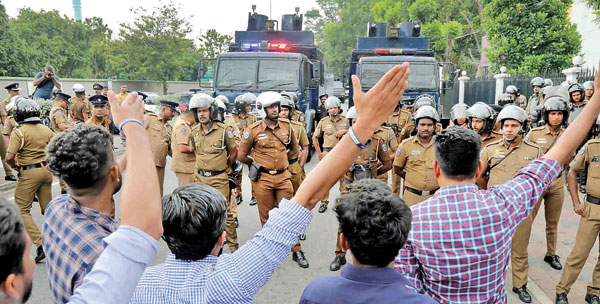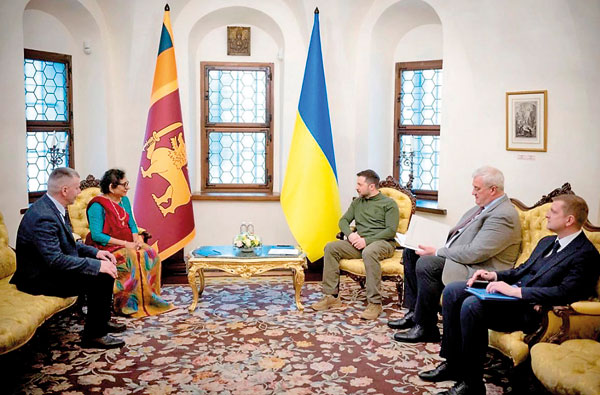Columns
Ranil W-style protest busting: Life in Govt. differs from life in opposition
View(s): 191
Police broke up a student protest outside the Health Ministry premises early Friday, arresting 27 of them. The protest had been organised by the Inter-University Students Federation (IUSF), which alleged that the government had curtailed Allied Health Sciences graduate intake to the public sector.
Police had earlier obtained a court order from the Maligakanda Magistrate’s Court against the protest. The students, who had started a ‘Satyagraha’ in front of the ministry, were arrested on charges of violating that court order. When the arrested students were produced in court, 25 were granted bail, while the IUSF’s convener and the secretary of the Allied Health Sciences Students’ Union were remanded until April 4.

A large police force was deployed to control university student protests outside the Health Ministry premises on Thursday.
The IUSF and several other unions, however, likened the way Police broke up the protest in the middle of the night to the violent tactics used to dismantle the protest site at Galle Face Green in 2022, soon after Ranil Wickremesinghe was sworn in as President. One IUSF activist told a news conference that it seemed as if the National People’s Power (NPP) had simply taken up the mantle from Wickremesinghe in cracking down on peaceful protesters.
Such allegations will no doubt sting government politicians, who have been highly sensitive to claims they are following their predecessor’s path in any manner. They are increasingly coming to terms with the fact that life in the Government is different from life in the opposition.
Geneva-thorn Ukraine seeks Lanka’s support for peace

Sri Lanka’s Ambassador Hasanthi Urugodawatte Dissanayake in conversation with Ukrainian President Zelensky after she presented her credentials.
Sri Lanka’s Ambassador to Ukraine, Hasanthi Urugodawatte Dissanayake, presented her credentials to President Volodymyr Zelensky recently, following which the two discussed enhancing bilateral cooperation.
At the meeting, President Zelensky thanked Sri Lanka for its active support in achieving a just peace for his country. “We would be grateful to
Sri Lanka for more active support on the path toward securing a just and lasting peace in Ukraine based on the UN Charter and international law,” Zelenskyy said. 
However, Sri Lanka hasn’t always had the support of Ukraine, particularly when the country was up against the United Nations Human Rights Council (UNHRC).
Ukraine has supported several UN resolutions against Sri Lanka, and they included the 2022 resolution to “extend and reinforce the capacity of the Office of the High Commissioner to collect, consolidate, analyse and preserve” evidence that may be used in future war crimes trials.
In camera and on camera: How police handled arrests of Deshabandu and Chamara
The recent arrests of former Inspector General of Police (IGP) Deshabandu Tennakoon and opposition parliamentarian Chamara Sampath Dassanayake have highlighted the different approaches that the Police adopt in handling high-profile cases.
When the former IGP surrendered to the court after evading arrests for weeks, Police made sure no photographs were taken of their one-time boss, or he was seen in public with handcuffs. The media showed only the pictures of a prison bus leaving the Matara Magistrate’s Court premises after he was remanded until April 3.
In total contradiction to that is the arrest of Badulla District MP Chamara Sampath Dassanayake, who has been critical of the government’s performance in the House. He was arrested this week on bribery charges for offences allegedly committed while he was the chief minister of the Uva province.
Before he was produced before the Colombo Magistrate Court, photojournalists were already there, as the news of his imminent arrest and his movements by the police were already doing the rounds in media circles. Police were seen cooperating with the journalists.
One photojournalist who covered the MP’s arrest was heard saying to his colleague that he would have appreciated the same efforts by Police when it came to the arrest of their one-time boss Deshabandu.
Karuna, Pillayan ditch rivalry to form alliance for polls
With the long-delayed local council elections scheduled to be held on May 6, politicians are pulling all the cards in their folders, including joining hands with their one-time rivals, since the polls are seen as a popularity test at the grassroots level.
Nowhere is this trend more evident than in the Eastern Province, where one-time political enemies— Vinayagamoorthy Muralidaran, alias Karuna Amman, and Sivanesathurai Chandrakanthan, alias Pillayan—have become bedfellows for the upcoming polls. The former was the one-time Eastern head of the now-defunct Liberation Tigers of Tamil Eelam (LTTE), and the latter was his erstwhile deputy who became the chief minister of the Eastern Province.
Not so long ago, the two groups were at each other’s throats after breaking away from LTTE. The upcoming local polls have brought the two together under one banner called ‘Eastern Tamil Alliance’, forcing them to sign a Memorandum of Understanding (MoU) last Saturday in Batticaloa.
Meanwhile, former State Minister Sathasivam Viyalendran, who was also instrumental in setting up the group, was taken into custody on Tuesday by the Commission to Investigate Allegations of Bribery or Corruption (CIABOC).
As the popular saying goes in political circles, which is often attributed to Lord Palmerston, a British statesman and prime minister in the 19th century, “There are no permanent enemies, nor permanent friends, only permanent interests.” This seems applicable to former militant leaders too.
Three-in-one resignations raise questions
With the resignation of National Transport Commission (NTC) Chairman Dr. Bandura Dileepa Witharana this week, three chairpersons of institutions coming under Transport, Highways, Ports and Civil Aviation Minister Bimal Rathnayake have now resigned from their posts.
This follows the resignations of the National Transport Medical Institute Chairman, Dr. Ruwan Wijayamuni, and the Sri Lanka Transport Board (SLTB) Chairman, Ramal Siriwardena.
The three resignations from institutions coming under one ministry, all within a span of four months, obviously raise some serious questions—the most important being whether each resignation was due to a different reason or if there was a common thread running through them.
Cold war brewing over IGP post
A resolution seeking the establishment of a Commission of Inquiry to investigate charges of misconduct and gross abuse of power against Inspector General of Police (IGP) Deshabandu Tennakoon is due to be presented to Parliament either on April 8 or 9.
Mr Tennakoon is suspended from his duties, and Priyantha Weerasooriya continues to serve as Acting IGP. While the removal of Mr Tennakoon is still a long way off, a cold war’ is already brewing regarding who will succeed him as the next IGP.
At least seven senior police officers are thought to be in the running to be the next IGP.
If Mr Tennakoon does lose his post, whoever emerges victor from this bruising campaign to become the next IGP will have the unenviable task of picking up the pieces of what has been one of the darkest periods of the Police Department and rebuilding its battered reputation to win back the public’s trust.
Namal critical of Mahinda-era mistakes
Sri Lanka Podujana Peramuna (SLPP) Hambantota District parliamentarian Namal Rajapaksa cautioned the National People’s Power (NPP) government on Thursday not to make the same mistakes they did in taking “political decisions” regarding certain public officials.
He was referring to the resolution the government is planning to introduce seeking the removal of Inspector General of Police Deshabandu Tennakoon.
Speaking to a group of journalists, Mr Rajapaksa said his party was still paying the price for such wrong political decisions regarding some public officials. One journalist pointed out that while Mr Rajapaksa was speaking about affording due process to Mr Tennakoon, a government that he, himself, represented did not do anything of the sort for the country’s then Chief Justice Shirani Bandaranayake when they impeached her. “I am of the opinion that it would have been better if what happened to her had not occurred. That is why I said that this government should not repeat our mistakes,” the SLPP MP responded.
In expressing such an opinion, Mr Rajapaksa was criticising his father Mahinda Rajapaksa, under whose presidency Ms Bandaranayake was infamously and controversially impeached and removed as Chief Justice in 2013.
Tamil Nadu fisher leader narrwoly escapes arrest here
A visiting Tamil Nadu fishermen leader who was here this week in the North to take part in the informal talks between Indo-Lanka fishermen groups narrowly avoided potential arrest.
The reason: two of his bottom trawlers were seized in the recent past for engaging in bottom trawling, and he is also facing charges as the owner of the trawlers under amended provisions of the Fisheries (Regulation of Foreign Fishing Boats) Act No. 59 of 1979.
The Rameshwaram-based fishermen leader was notified of his potential arrest since he was named as a boat owner in the ongoing court cases. Soon after he came to know about these developments and possible imminent arrest, the fisher leader left the country mid-way via Palaly airport on Friday.
